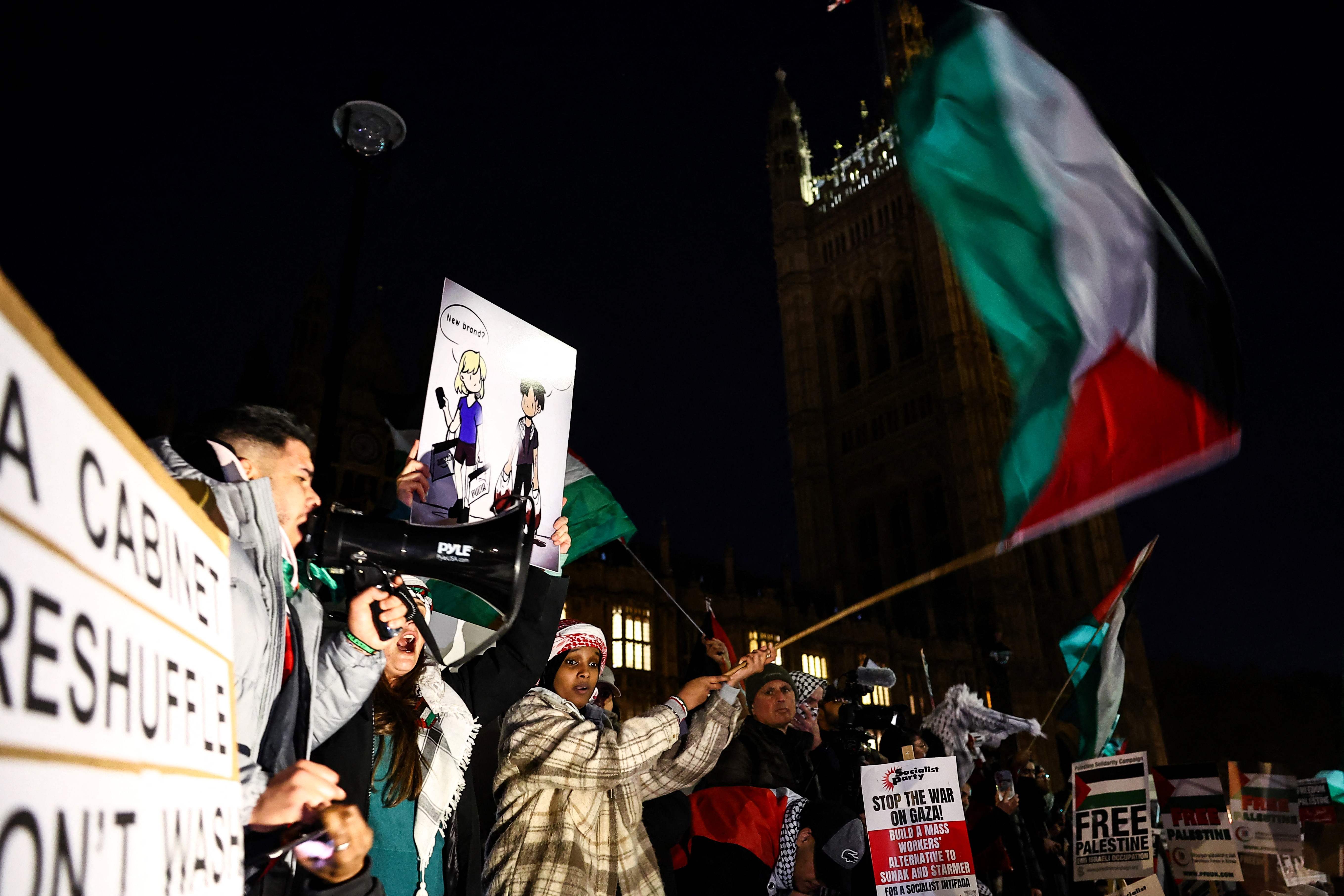I have deep feelings for Palestine and Israel – and had to march for both
I attended the pro-Palestine march and antisemitism rally on the same day to show solidarity with people who want to live in peace, writes the Reverend Richard Coles. The only solution to the current crisis is political – even if it is difficult not to see that as an impossible dream


In the 1930s my forebears, CofE shoemakers in Kettering, went into business with a family of Jewish retailers in Leeds, the Ziffs. As Kristallnacht erupted, that business relationship became a friendship – a friendship so significant my grandfather attended their bar mitzvahs and gave the speech of honour at the wedding of young Mr Ziff, who wrote to me about it after I did a thing in Leeds. I remember they gave us magnificent presents for birthdays and confirmations. Arnold Ziff, philanthropist, former High Sheriff of West Yorkshire, came to pay his respects to my grandmother when she turned 100.
I lived in West Yorkshire about 20 years ago, near Dewsbury, where many families from Pakistan settled in another wave of immigration in the Sixties and Seventies. One was Sayeeda Warsi’s; another, settled in Glasgow, was Aasmah Mir’s. I have learned from them what Britain was like for Muslims in a time when assault was routine, an invaluable lesson (and also how to cook okra, invaluable too).
Friendship between people of different faiths and faith traditions means something to me. You don’t need a personal reason to be intolerant of antisemitism or Islamophobia, but it does feel personal to me, and that is why I had a busy weekend, attending the Palestine rally in Trafalgar Square on Saturday and the antisemitism rally in Parliament Square on Sunday.
This caused some comment from friends, who think it should be either one or the other. I can understand why. There were people in Trafalgar Square who think Jews have no place between the river and the sea and there were people in Parliament Square who wanted to displace Palestinians from the West Bank by illegally settling it.
A plague on both your houses. I went in solidarity with the people on both sides who want to live in peace and for their children to grow up and lead contented lives. Just to grow up would be a start. Most people, most of the time, want this. To me that means a two-state solution I guess, which fewer and fewer on either side think viable, and it is difficult now not to see it as an impossible dream; but is there a credible alternative?
I do not think so. Not if you accept, as I do, that both Israel and Palestine have legitimate claims to the same part of the world. This is not just a matter of the mind – it is of heart and spirit too. I cannot edit out the deep feeling I have for Israel as an historic homeland answering centuries of dispossession, persecution, and attack. I cannot edit out the deep feeling I have for Palestinians who are right now dispossessed, persecuted and under attack. I was in Hebron on the West Bank a while ago, taking Christian pilgrims to see the Tomb of Abraham, sacred to all three religions. We had to flee because of a violent clash with settlers.
So what should I do? I want to live now in anticipation of a peace yet to be achieved, even if it seems impossibly distant. There is a long history of this in Christianity, and in a specific form in the Church of England, which has been attempting to reconcile the irreconcilable since its foundation in the blood, fire and statecraft of the Reformation.
It requires a degree of courage to do that, a friend said wryly. And taking the middle way between irreconcilables implies an equivalence which can seem facetious. What sort of an equivalence is measured in death tolls? Or degree of depravity?
In the Second World War Bishop Bell of Chichester denounced the Allied tactic of area bombing which killed hundreds of thousands of civilians. It won him few admirers. I saw a photograph the other day of a woman in torment looking at a pile of dead children pulled from the rubble of her bombed neighbourhood. It was taken not last week in Gaza but in Cologne in the 1940s, and the bombs had been dropped by the RAF. Bell insisted that there was no military objective that justified such a loss of civilian life. He was not ignorant of the horrors of Hitler’s regime, he was a close friend of the anti-Nazi Lutheran pastor Dietrich Bonhoeffer, murdered in 1945, and a committed anti-Nazi from the early Thirties. Bell thought the war to defeat Germany was just. But not this way.
I think there should be no resumption, under any circumstances, of the bombing of Gaza. So ceasefire now? I don’t think so – not as long as Hamas continues to threaten Israelis with the horrors inflicted on 7 October. But not this way.
The solution to this is political. That can only happen when the common interest of living in peace is prioritised. The best way of achieving that is to build a consensus around it with those who want it too.



Join our commenting forum
Join thought-provoking conversations, follow other Independent readers and see their replies
0Comments